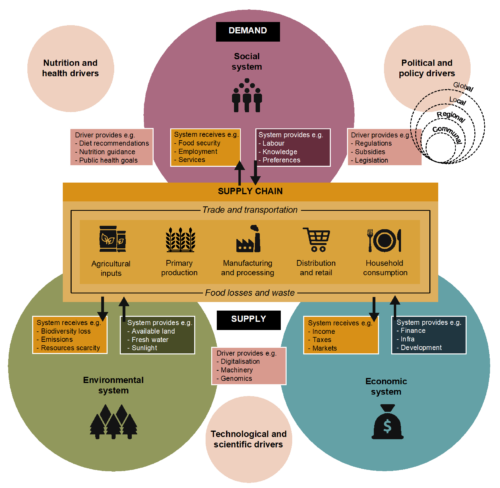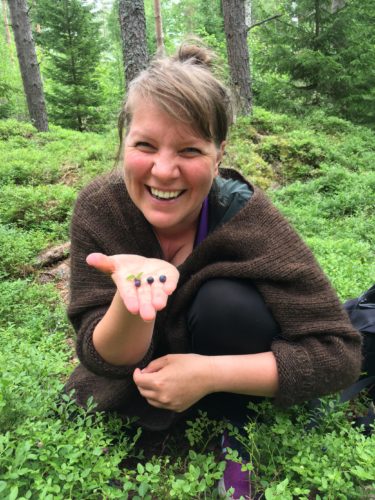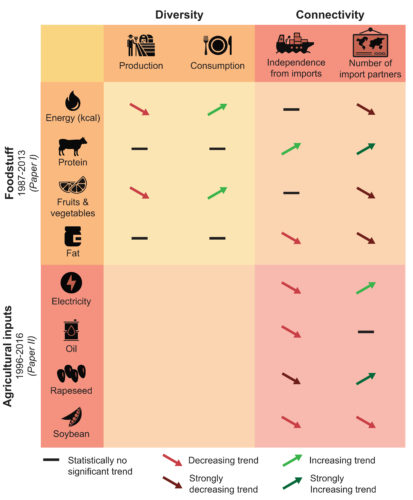9.12.2020
The global food system forms an interconnected and complex net that is facing contradictory demands and expectations from various sectors and multiple levels of society. Therefore, it is important to understand that the food system is much more than the food supply chain—it is impacted by environmental, social and economic systems as well as health and nutrition, policy and political, and technological and scientific drivers. The presented systems and drivers are connected with various linkages, interdependencies and feedback loops, making the food system equally intriguing and uniformly tricky. These internal connections within the food system have further inputs and outputs contributing or receiving from the supply chain (Figure 1).
Figure 1. The entity of the food system – combined with the social, environmental and economic sub-systems; and nutrition and health, political and policy, and technological and scientific drives. (click image for pdf)
Almost every country participates in the global food trade either as an importer, an exporter or both. Comprehensive country-scale studies are needed to detect blind spots within the complexity of the larger system and to discover the hidden potential within specific countries. I chose Finland as my case study because it has an interesting portfolio—a northern country rich in natural resources and a small population with relatively high self-sufficiency in terms of food production, but at the same time a great dependence on imported agricultural inputs (such as energy, fertilisers, protein feed and agricultural machinery). My primary aim of this dissertation was to discover how Finland could positively impact on the global food system without weakening its own food system resilience. I chose three research questions to response the overall aim:
- RQ1: How is the Finnish food system connected to the global food system through international trade—regarding the trading partners, imports and exports?
- RQ2: How can Finland utilise the domestic agricultural production to have a positive impact on the global food system—regarding the natural resources?
- RQ3: How can the proposed changes in trade and production be implemented—regarding the food preferences and motivations of Finnish consumer?
The most significant finding of the research indicates that Finland’s overall food trade-related resilience has weakened as domestic food production diversity has decreased while its dependence on imported foodstuff has increased. Furthermore, international foodstuff trade has been centralised in terms of trading partners (Figure 2). However, Finland has the potential to replace some crop imports with domestic production and further increase certain animal product exports, while saving global natural resources and diminishing the outsourced environmental impacts of food production. Yet increasing domestic agriculture may lead to an amplified dependence on imported agricultural inputs. This may not be as detrimental to system reliance as its foodstuff dependence, since the number of import connections has increased over the past decades for agricultural inputs. Finally, consumers are often the key to influence in the food system. An analysis done based on a recent national questionnaire study reveals that Finns are most motivated to eat sustainably when they can combine health and environmental co-benefits in their everyday life.
Figure 2. Finland’s trade-related resilience regarding the foodstuff and agricultural inputs. Diversity in production and consumption, and connectivity regarding the independency and trading partners were used as resilience indicators.
As a conclusion, I want to highlight that Finland’s positive contribution to the sustainable use of natural resources might be relatively small on the global scale, but it is not insignificant. Thus it is vital that global knowledge is incorporated at the country-scale and case studies continue to discover the hidden potential to influence towards a more sustainable food system through the wise use of natural resources.
Please feel free to follow my public defense through Zoom on Friday 11th December, at 12:00 hours (Finnish time)
Electronic dissertation: https://aaltodoc.aalto.fi/handle/123456789/59139
Zoom-link: https://aalto.zoom.us/s/69732142929

Elina Lehikoinen (M.Sc.) is a doctoral student in Water and Development Research Group. Her research has focused on the connection between the Finnish and global food system, in the perspective of natural resources and resilience. The aim of her research has been to study what kind of positive impact one country could have on to the global food system. Lehikoinen is publicly defending her thesis on December 11th


